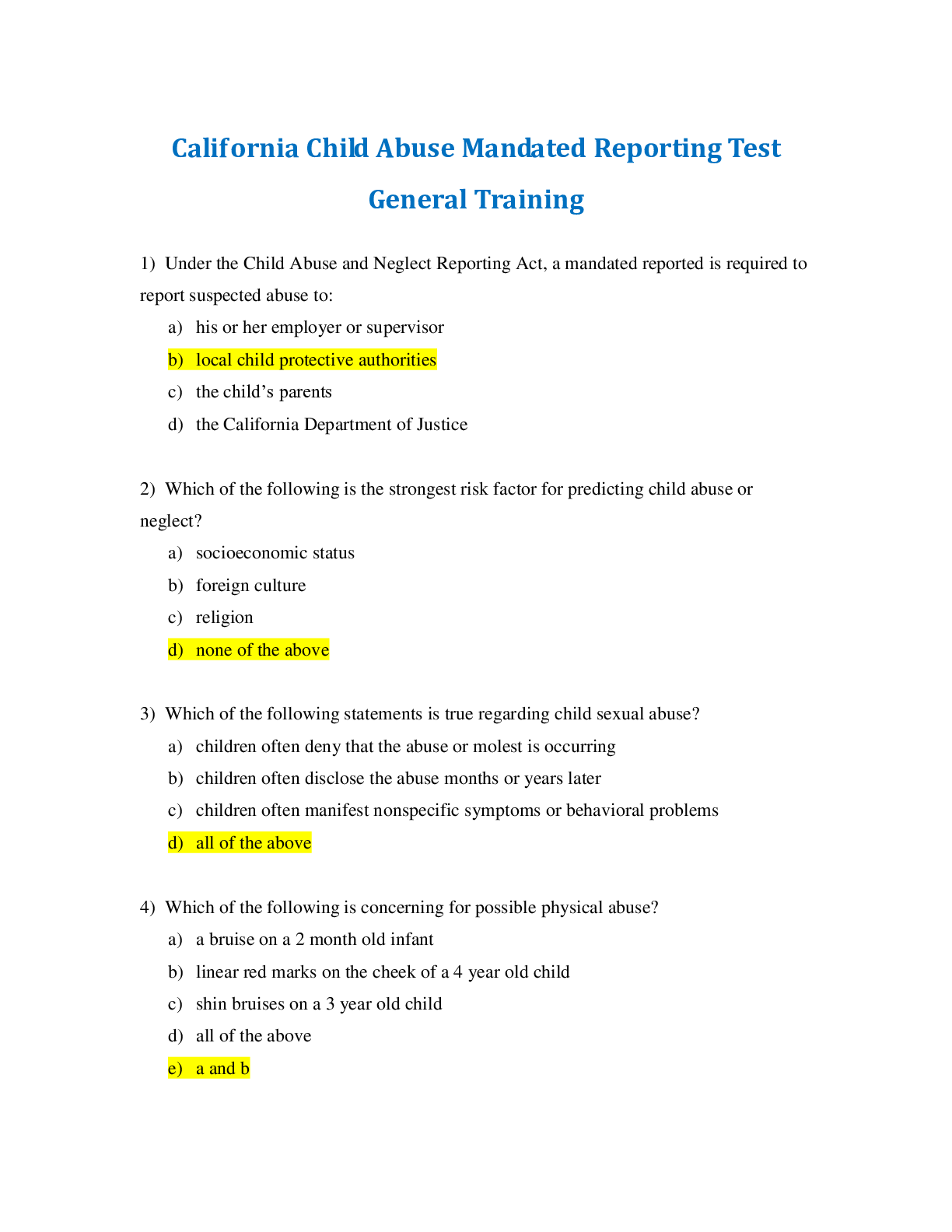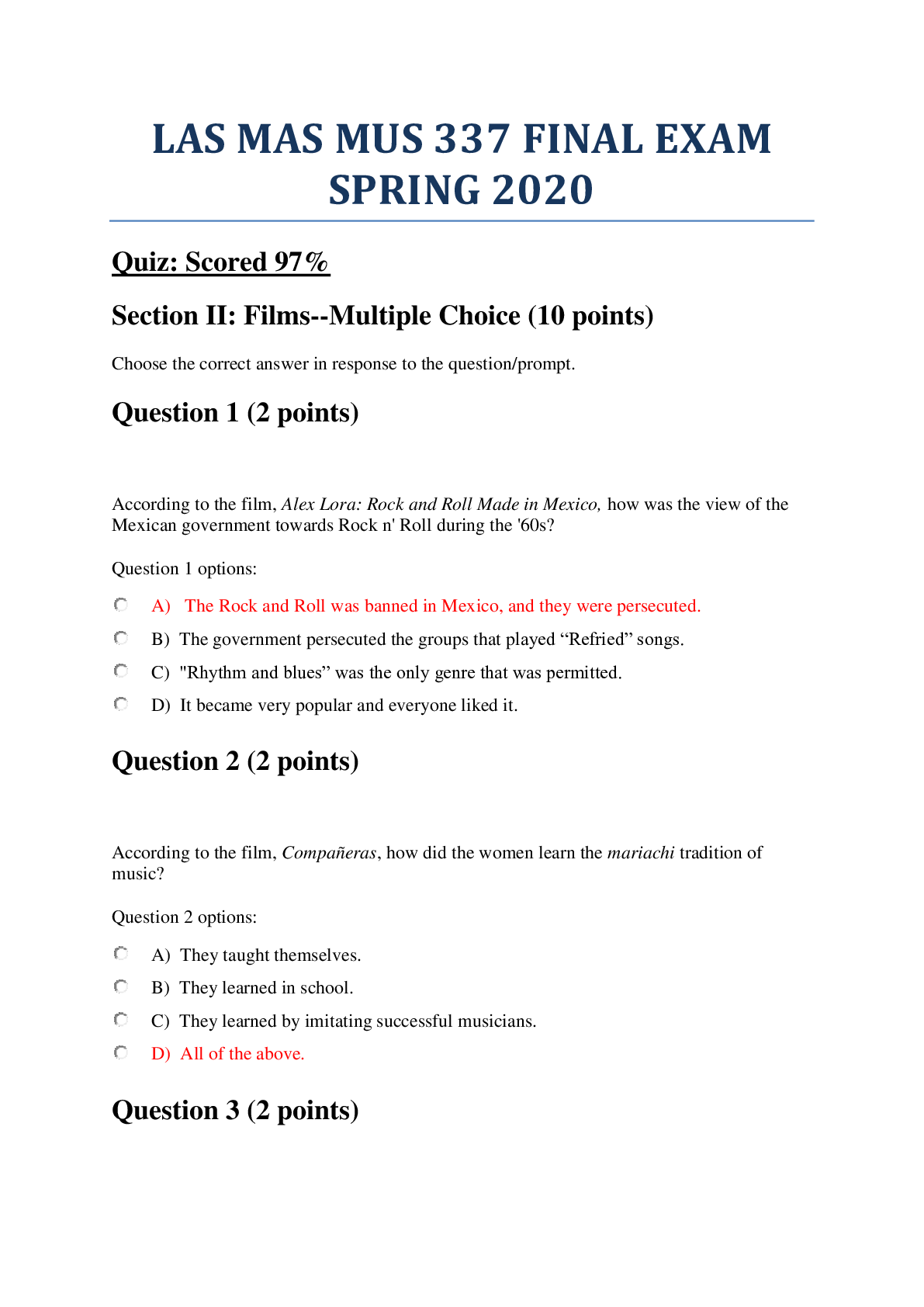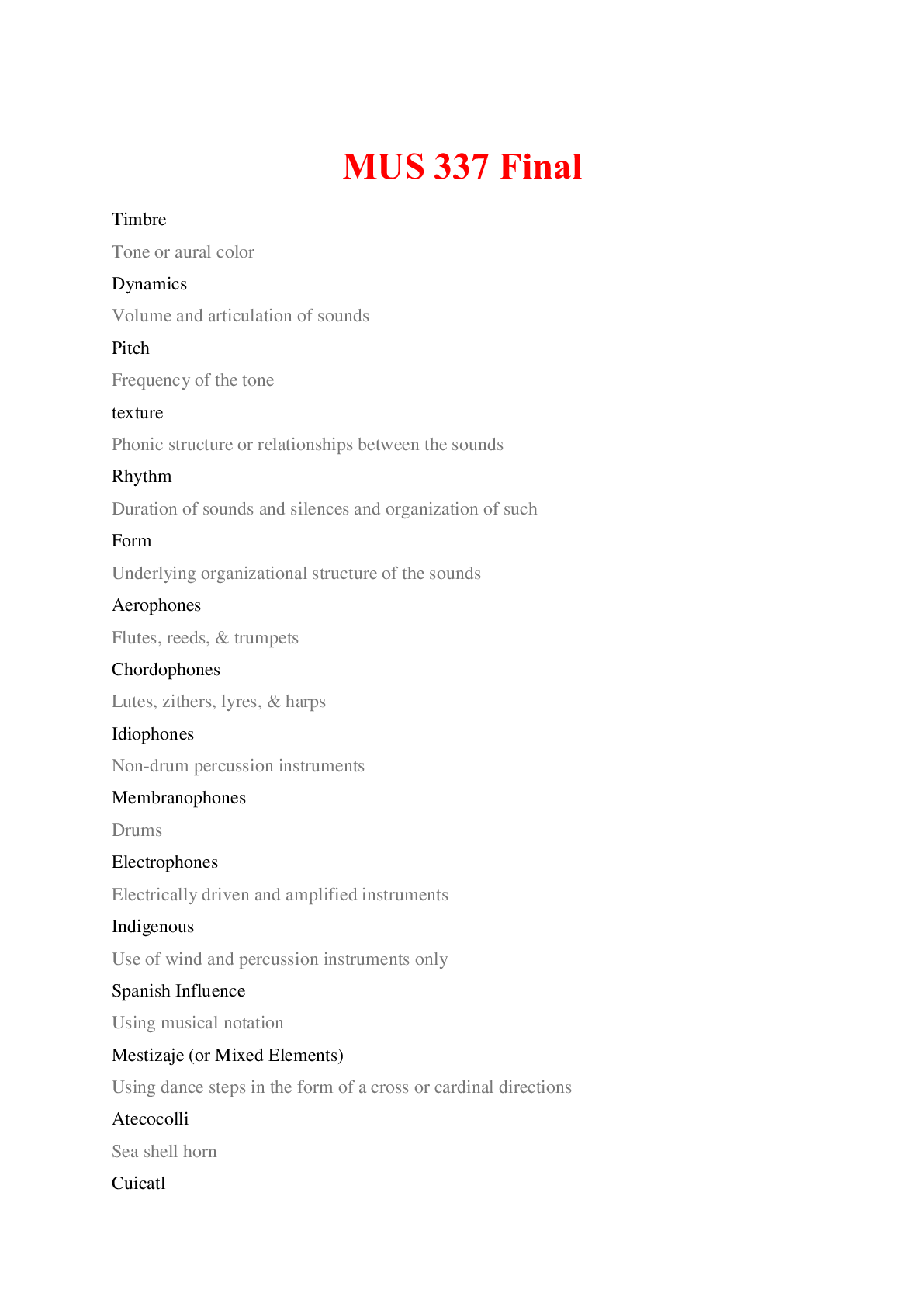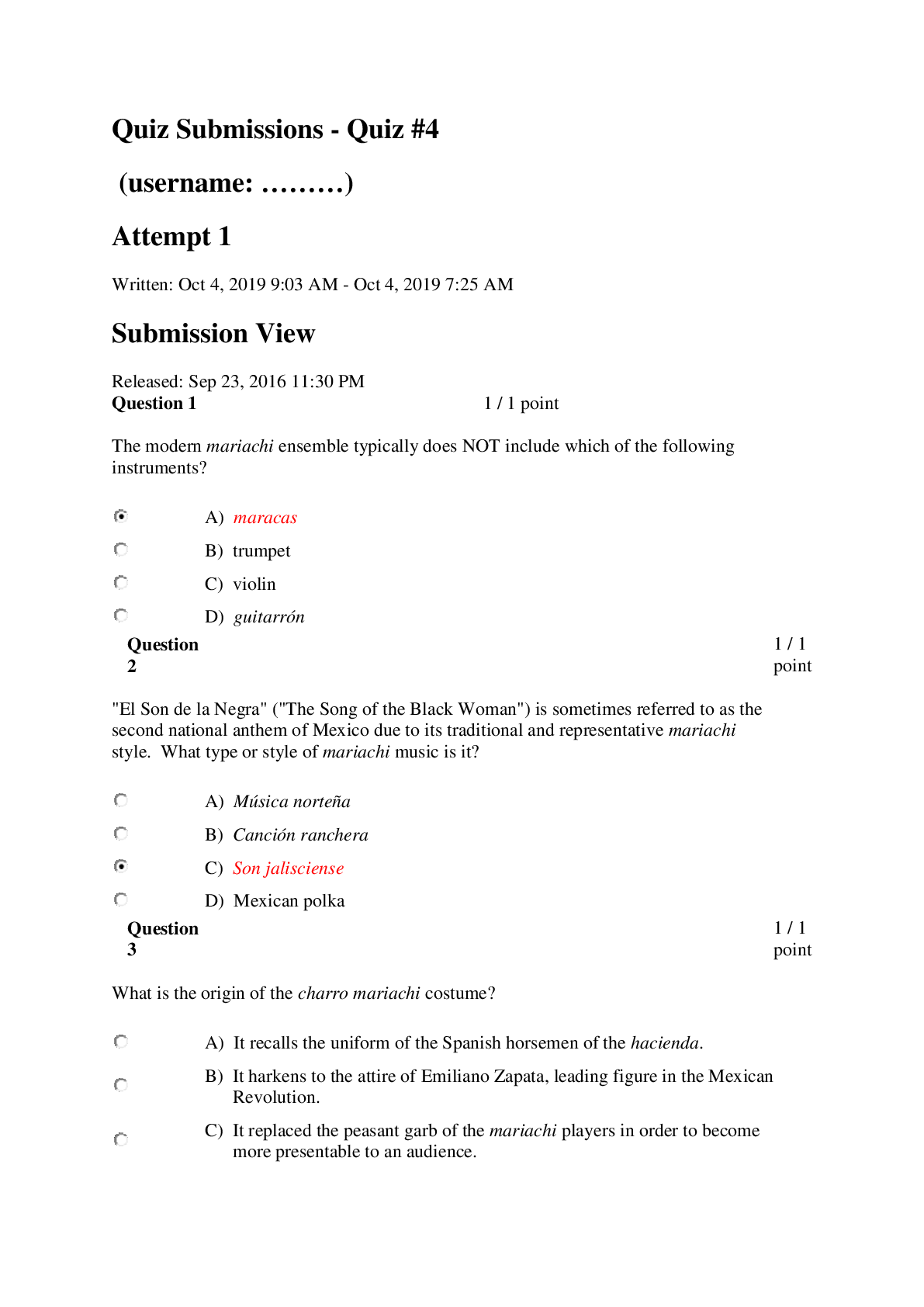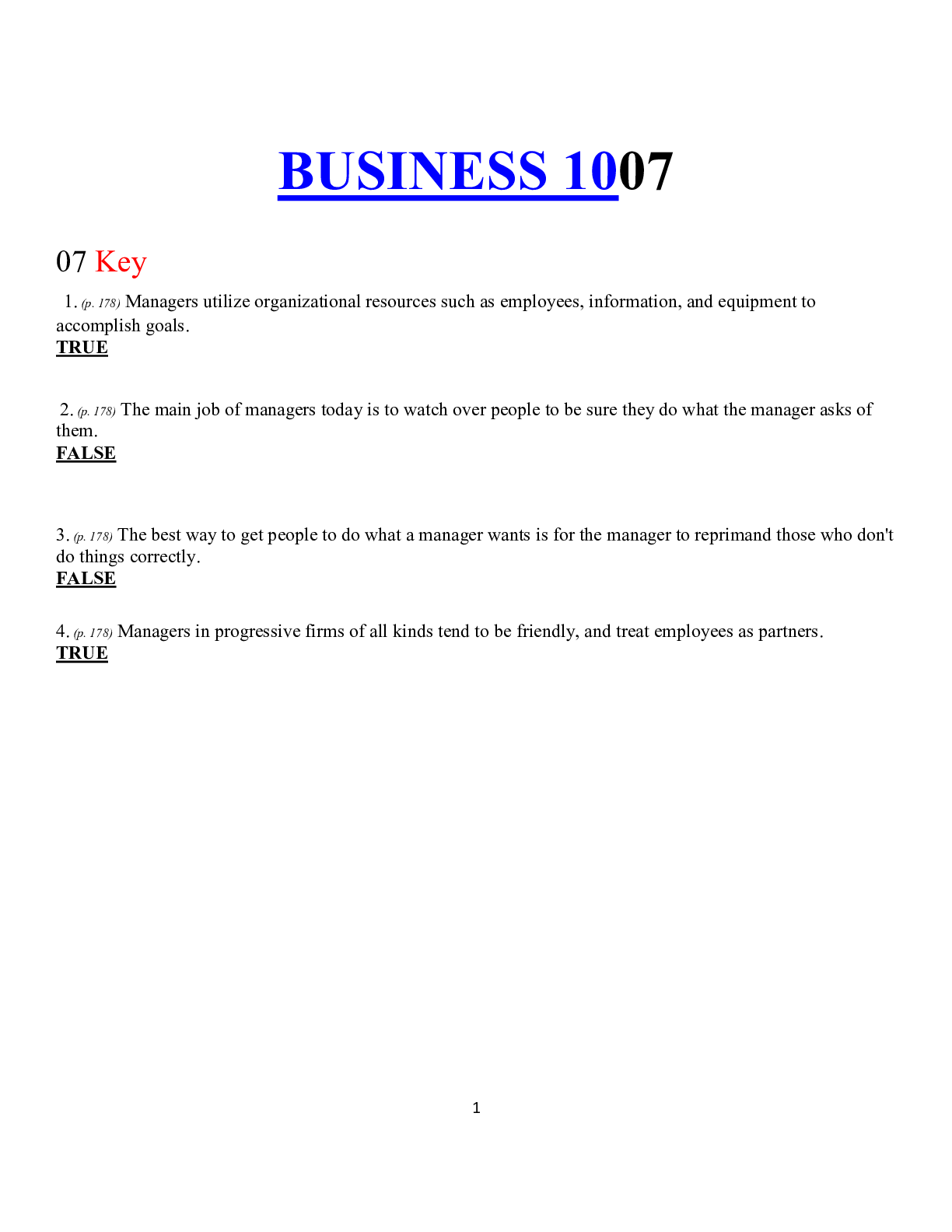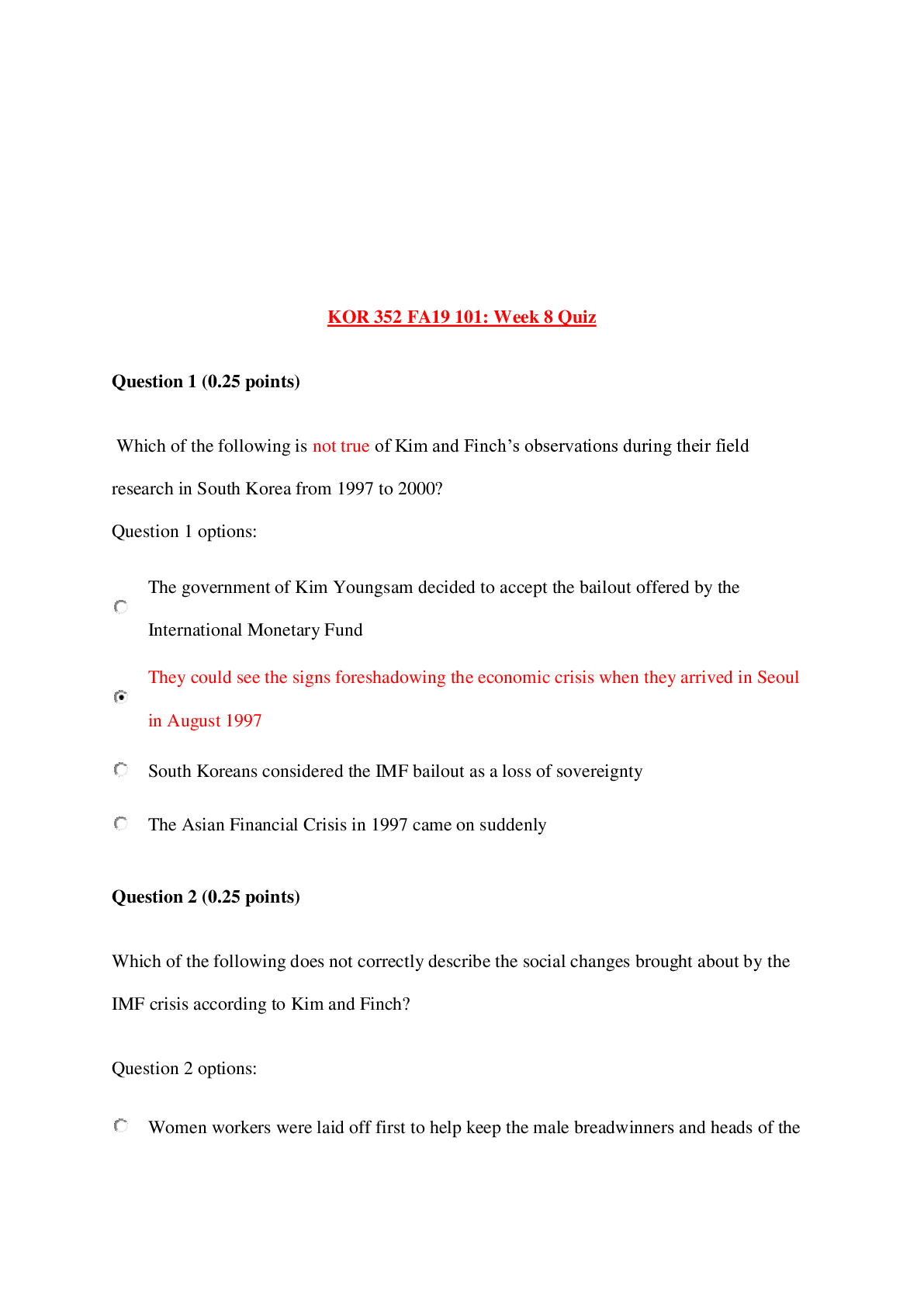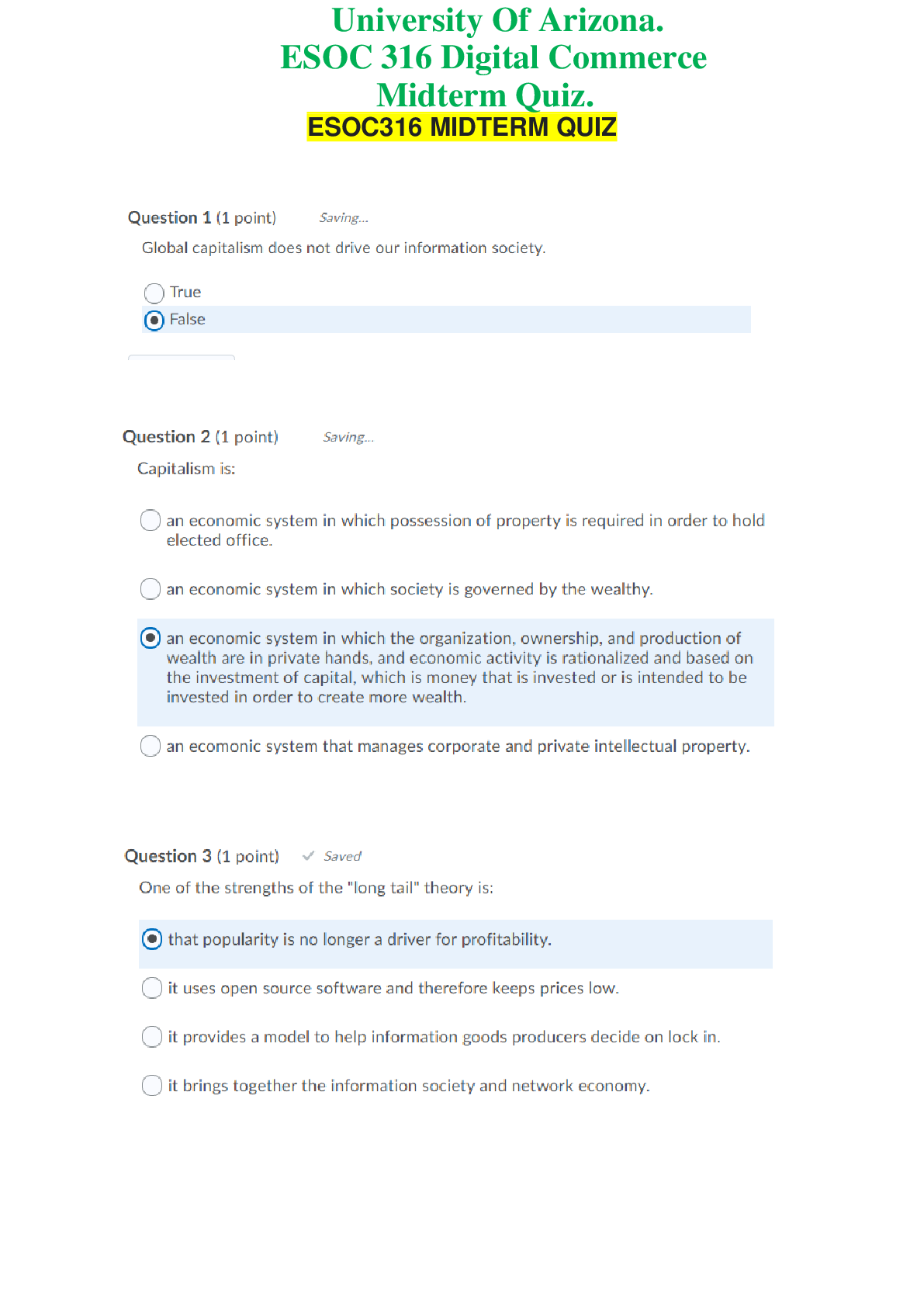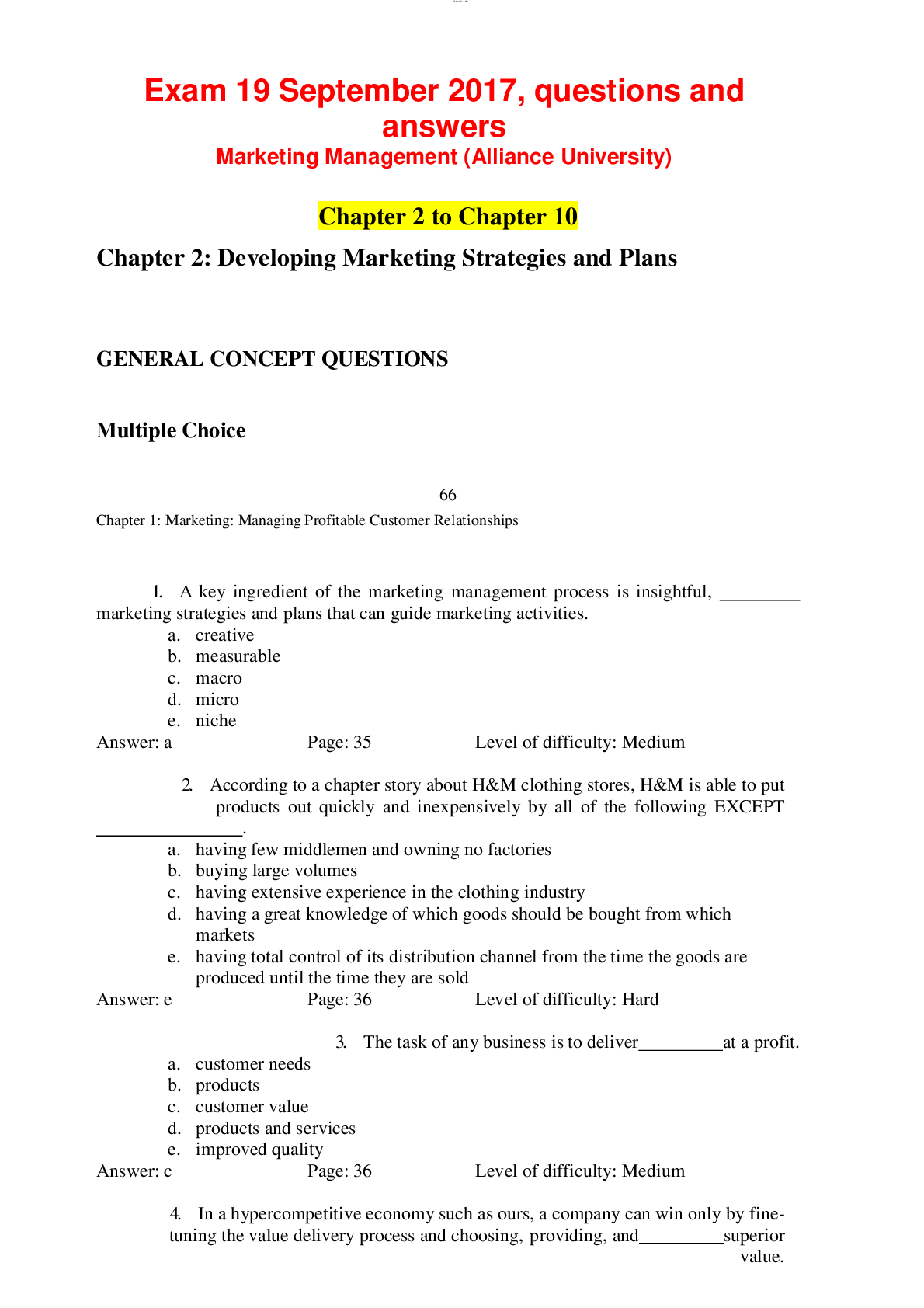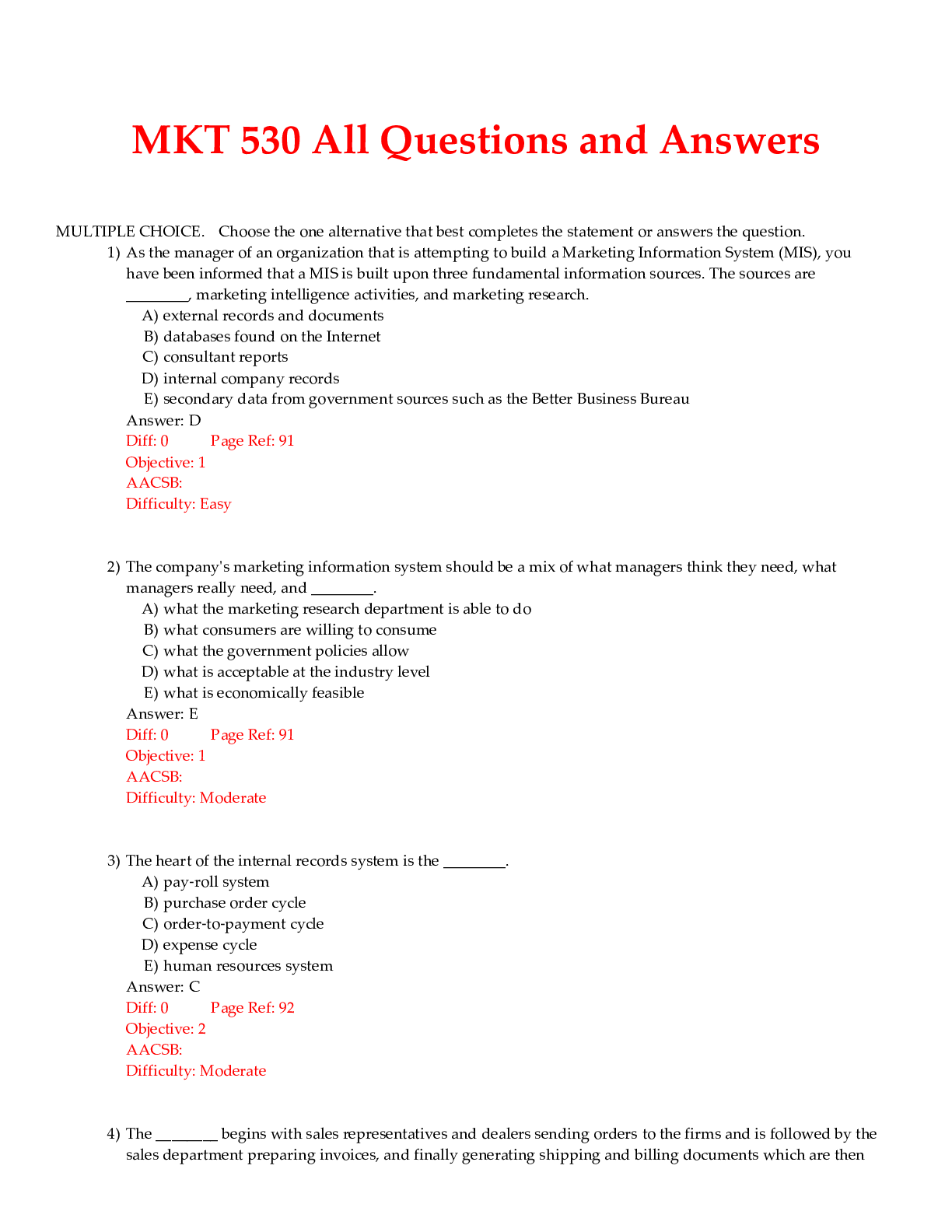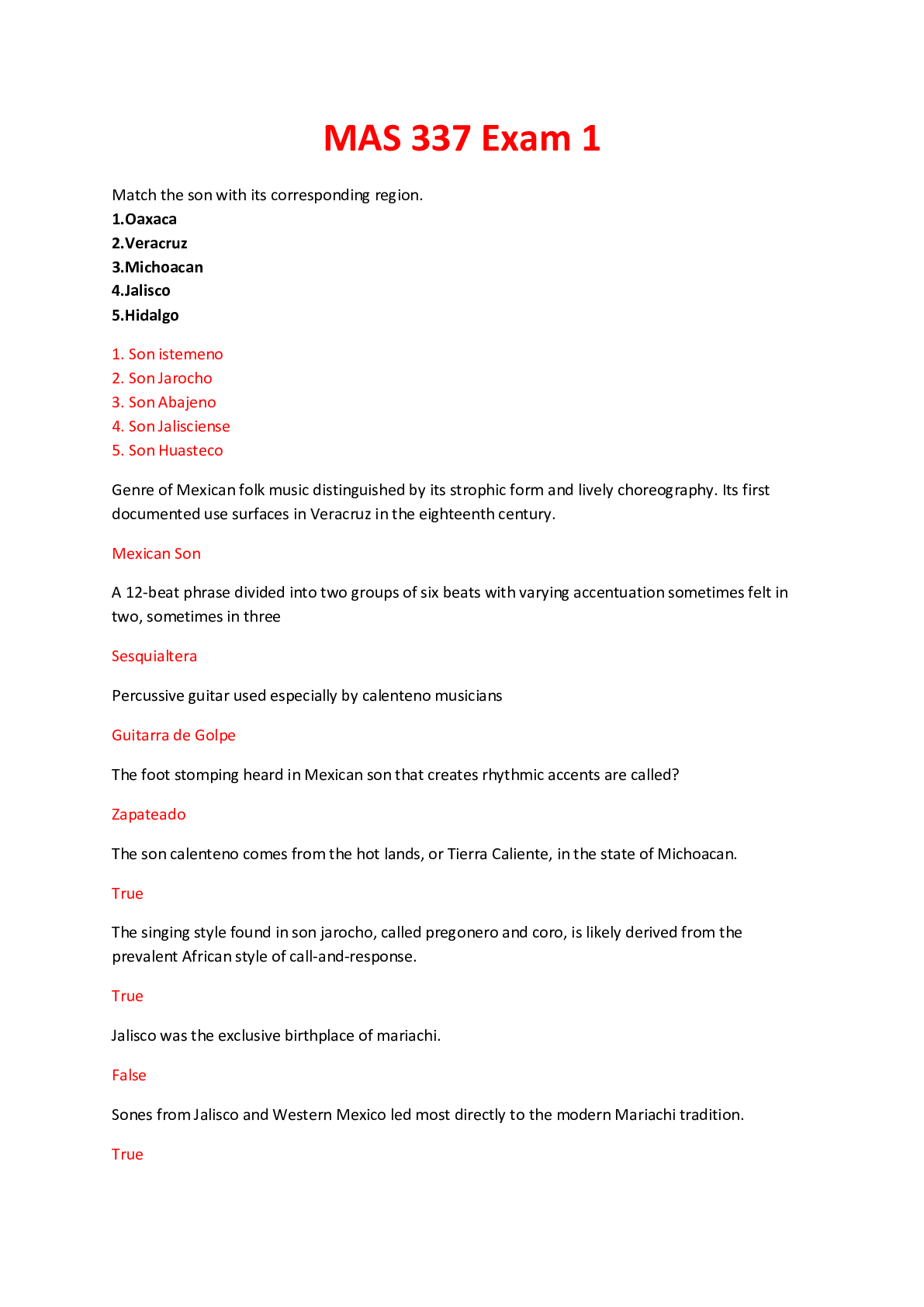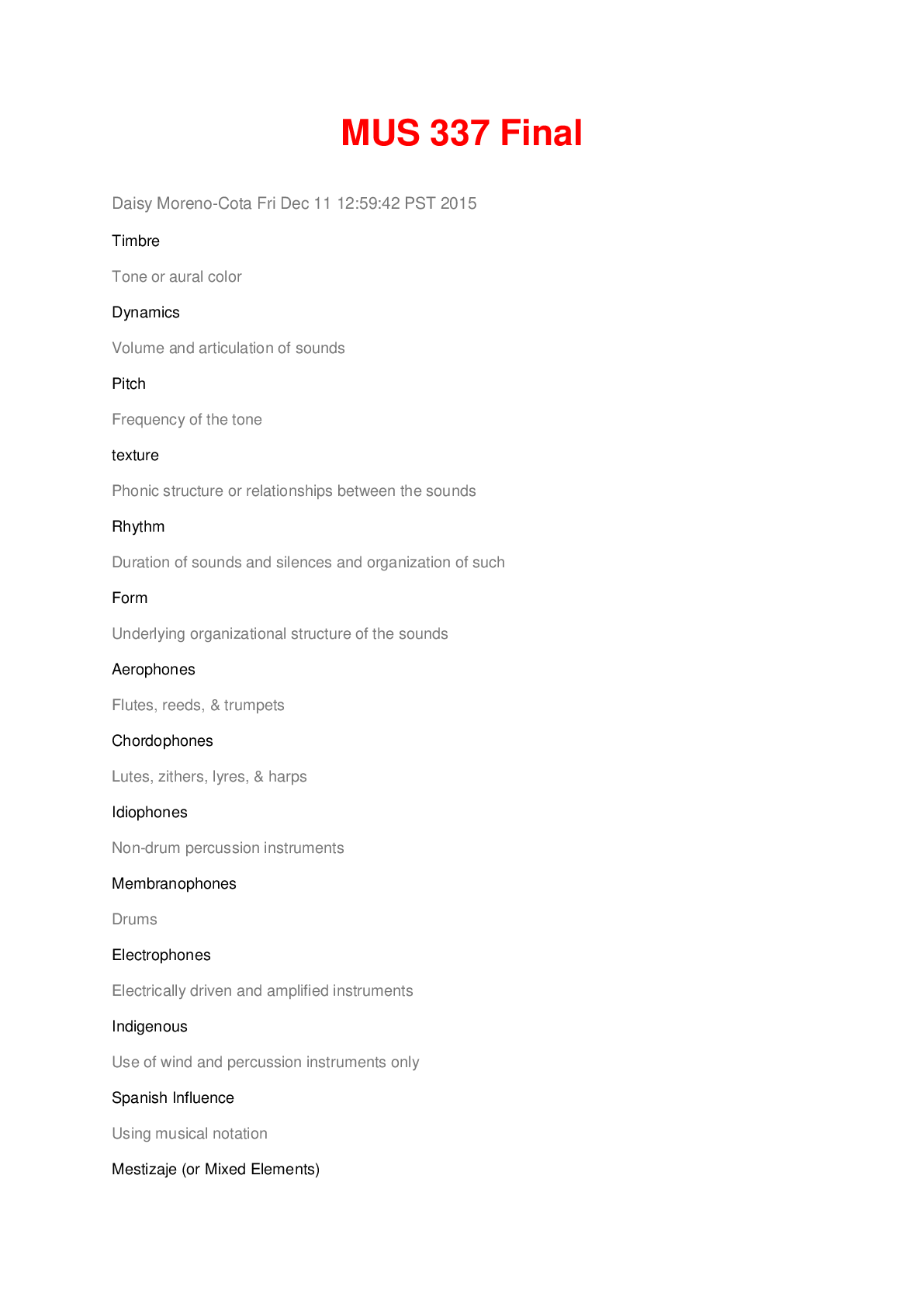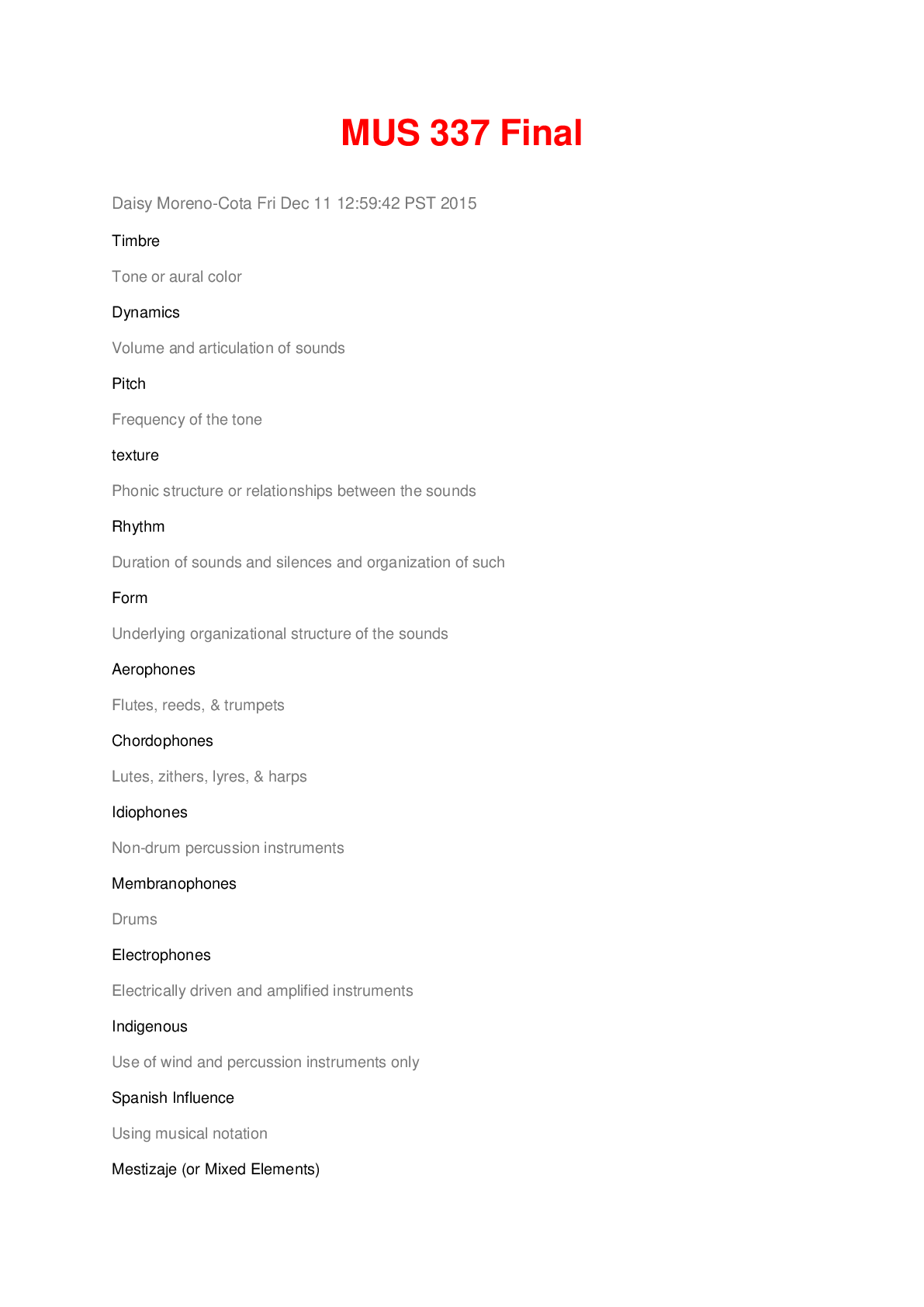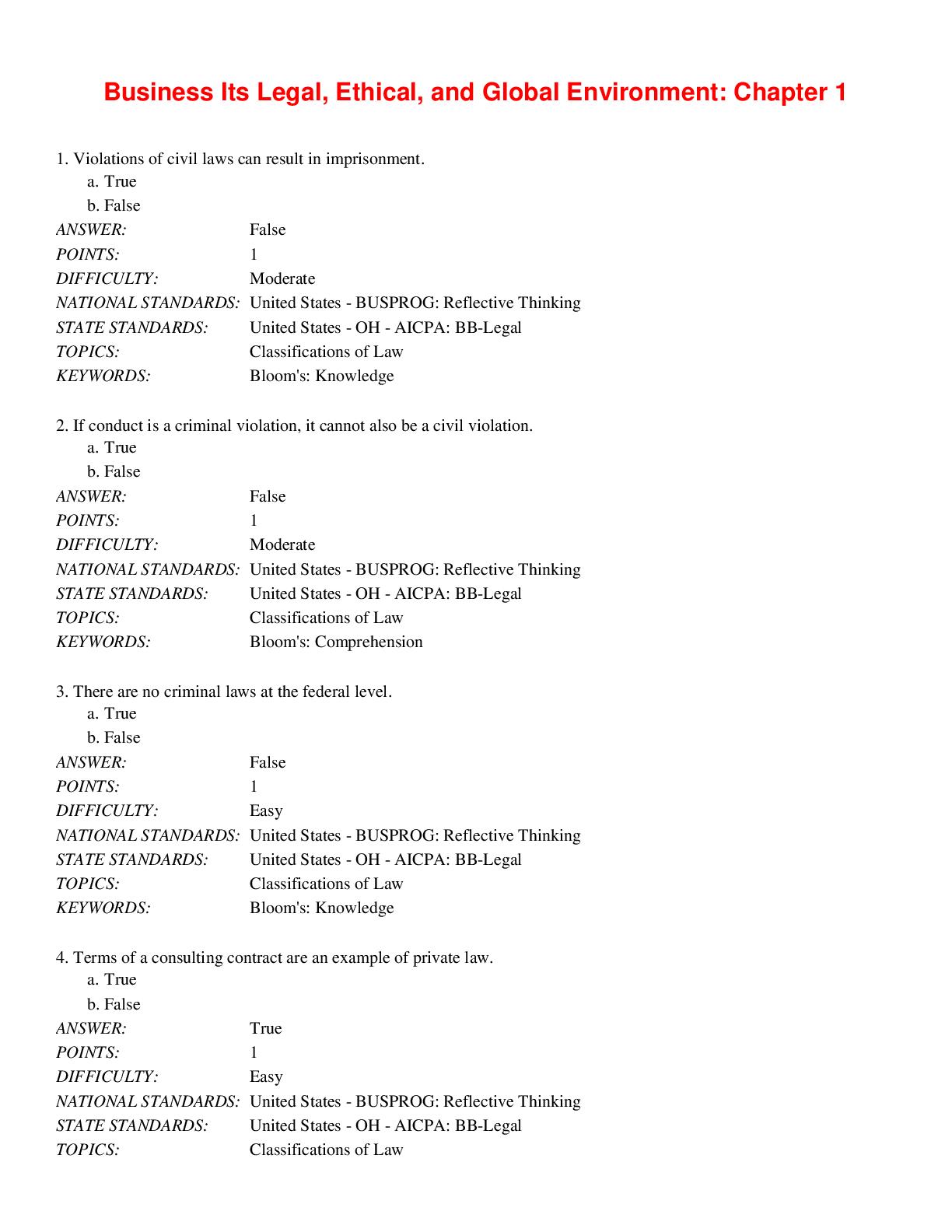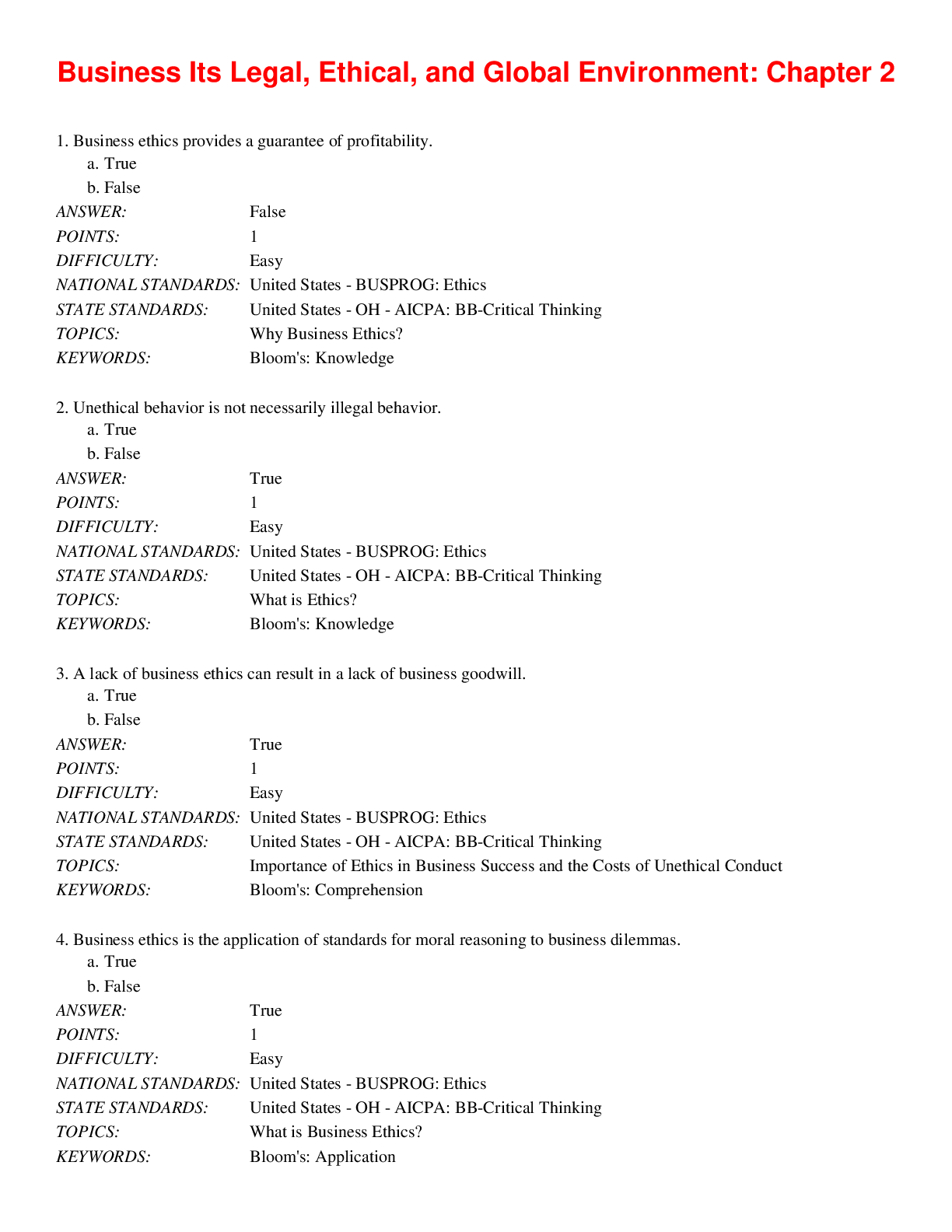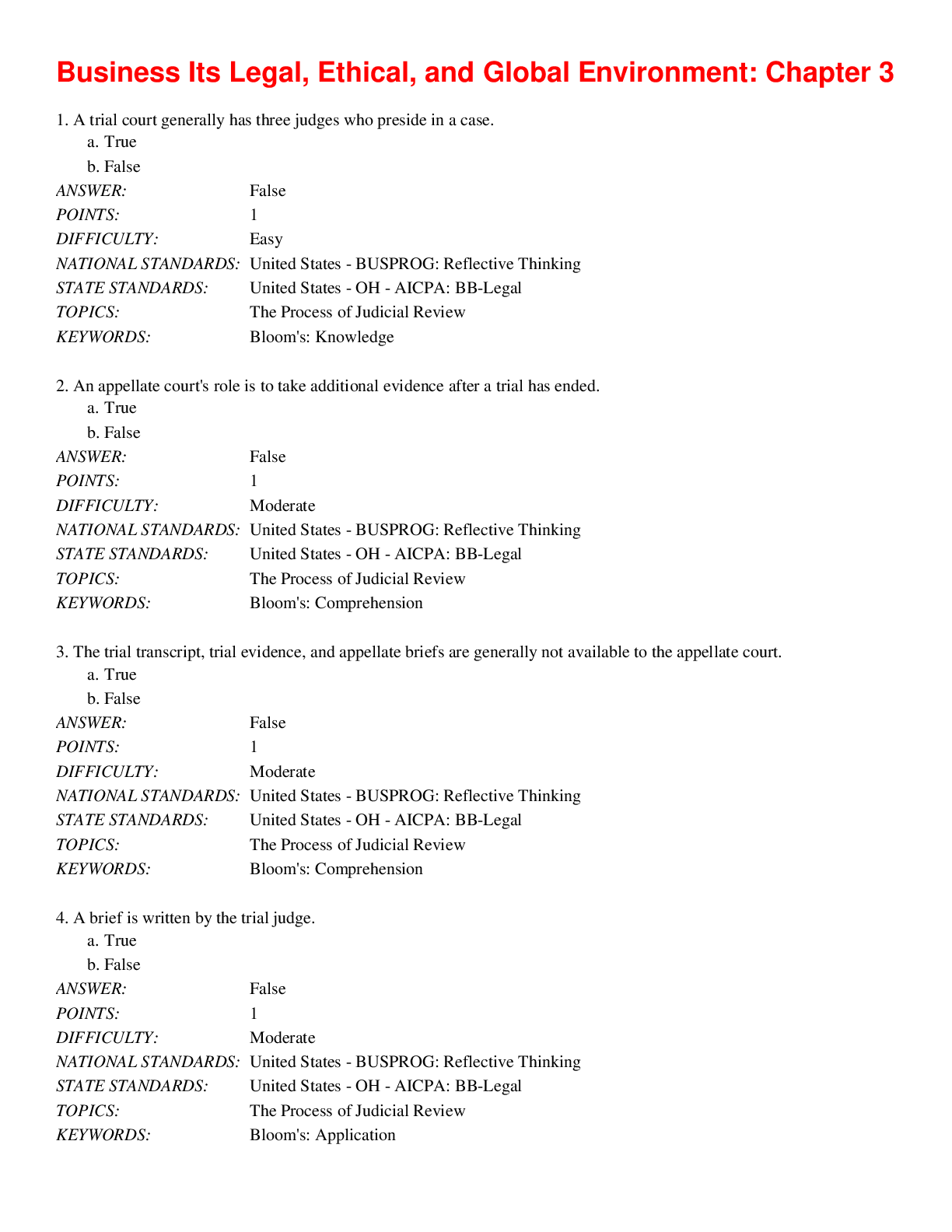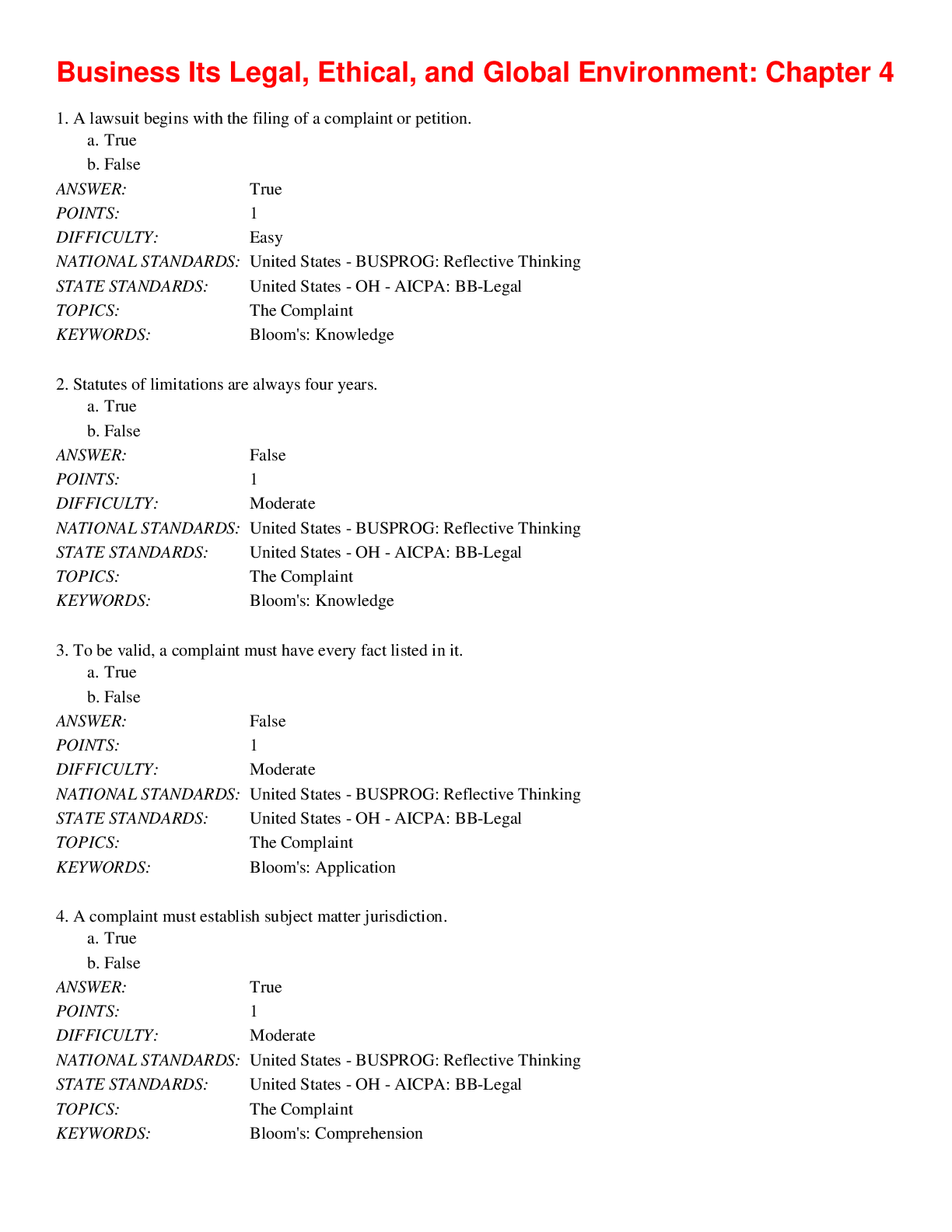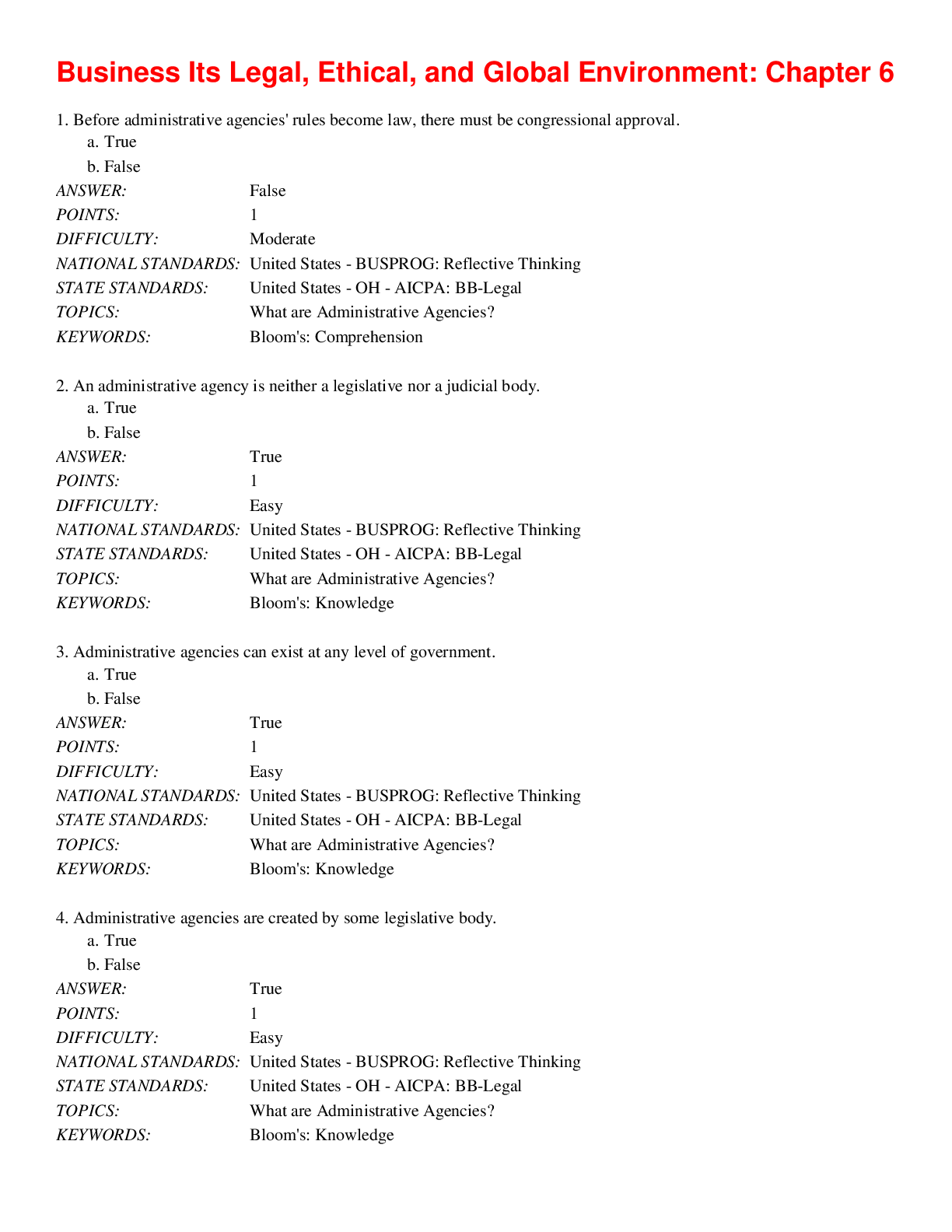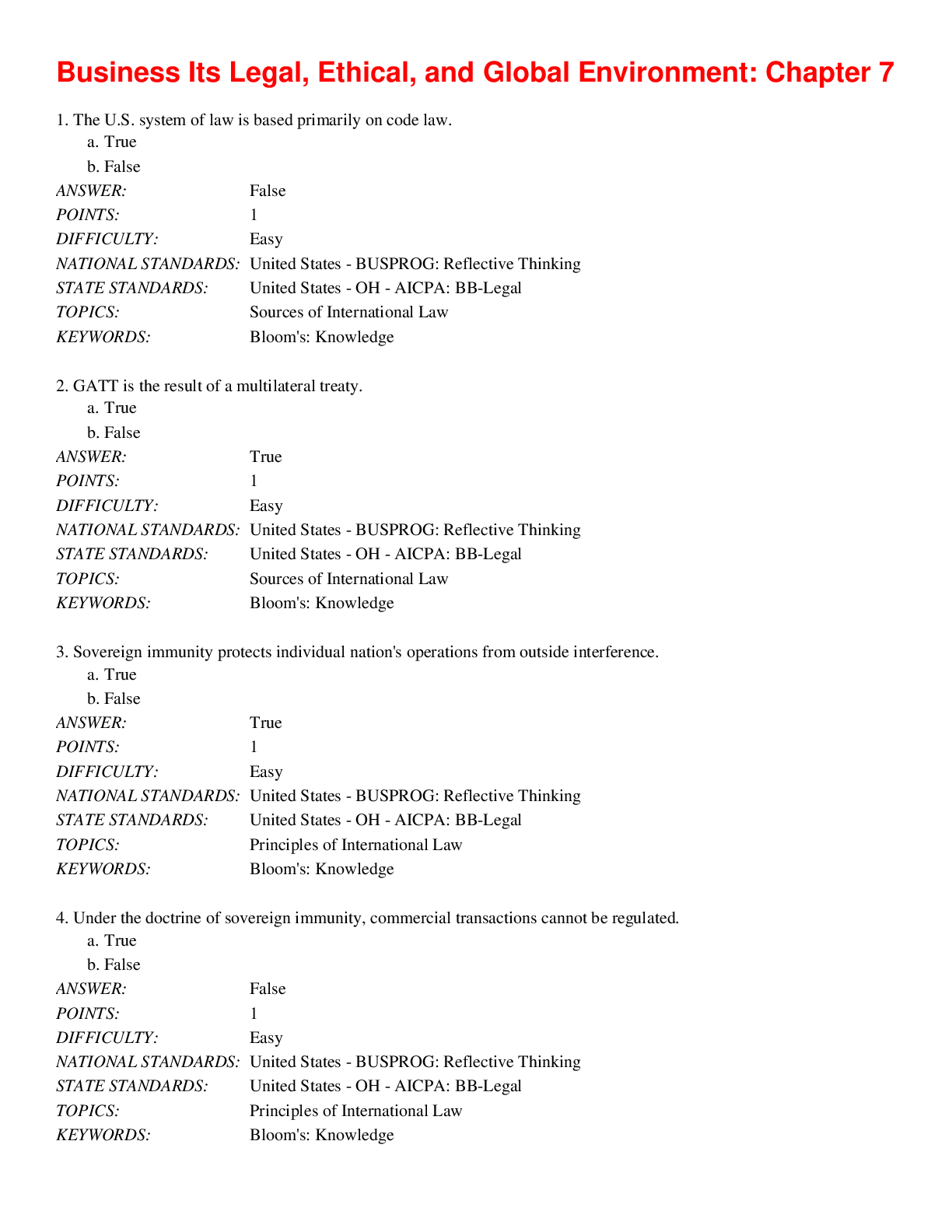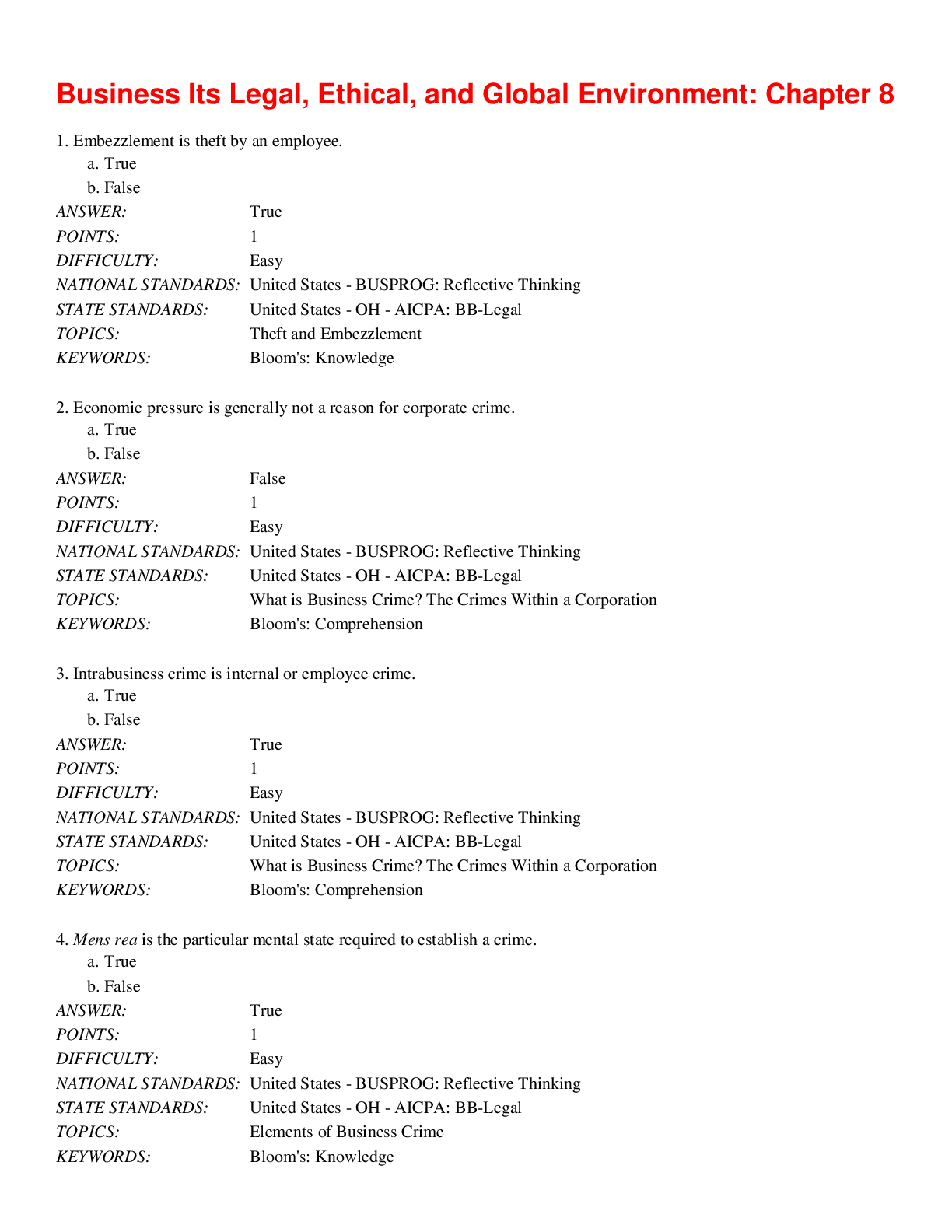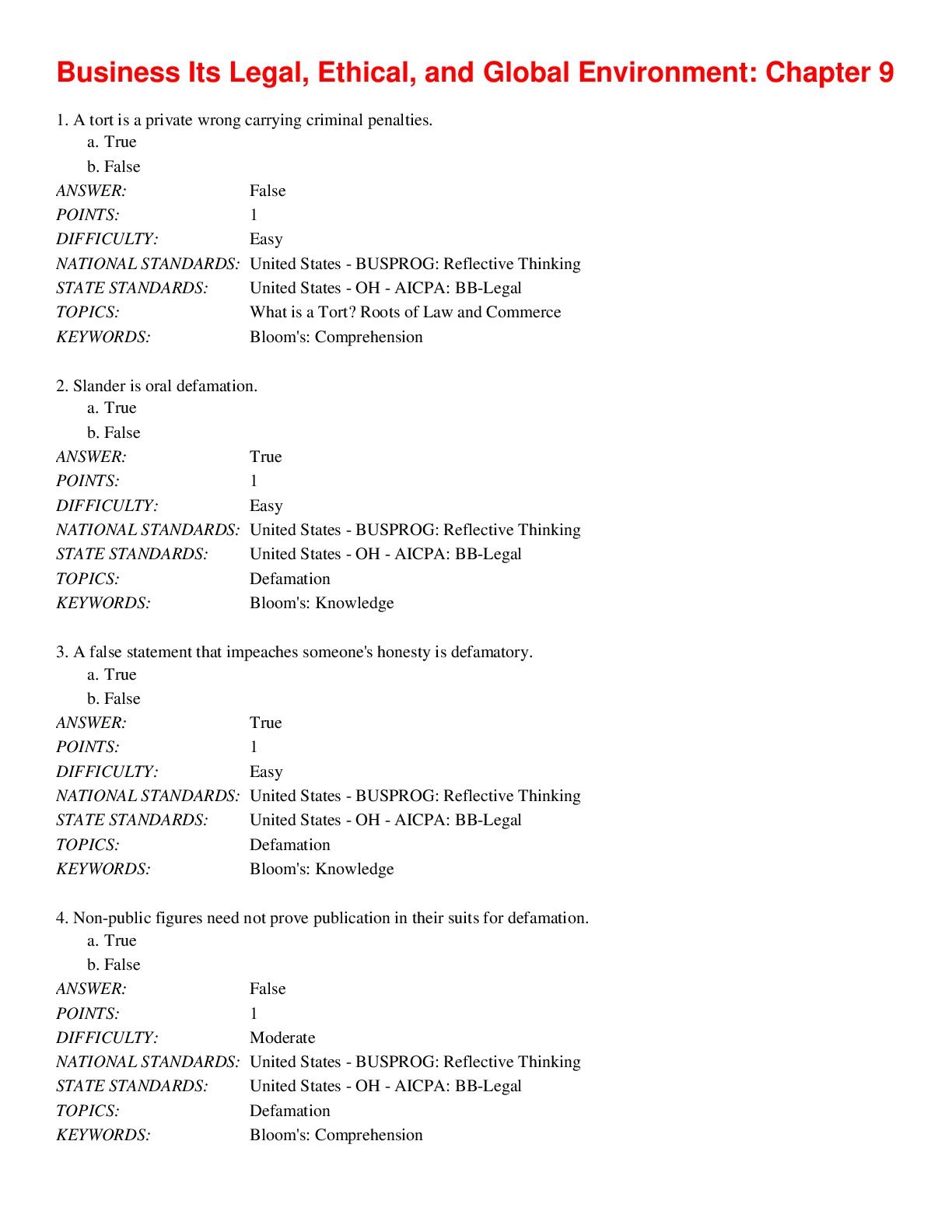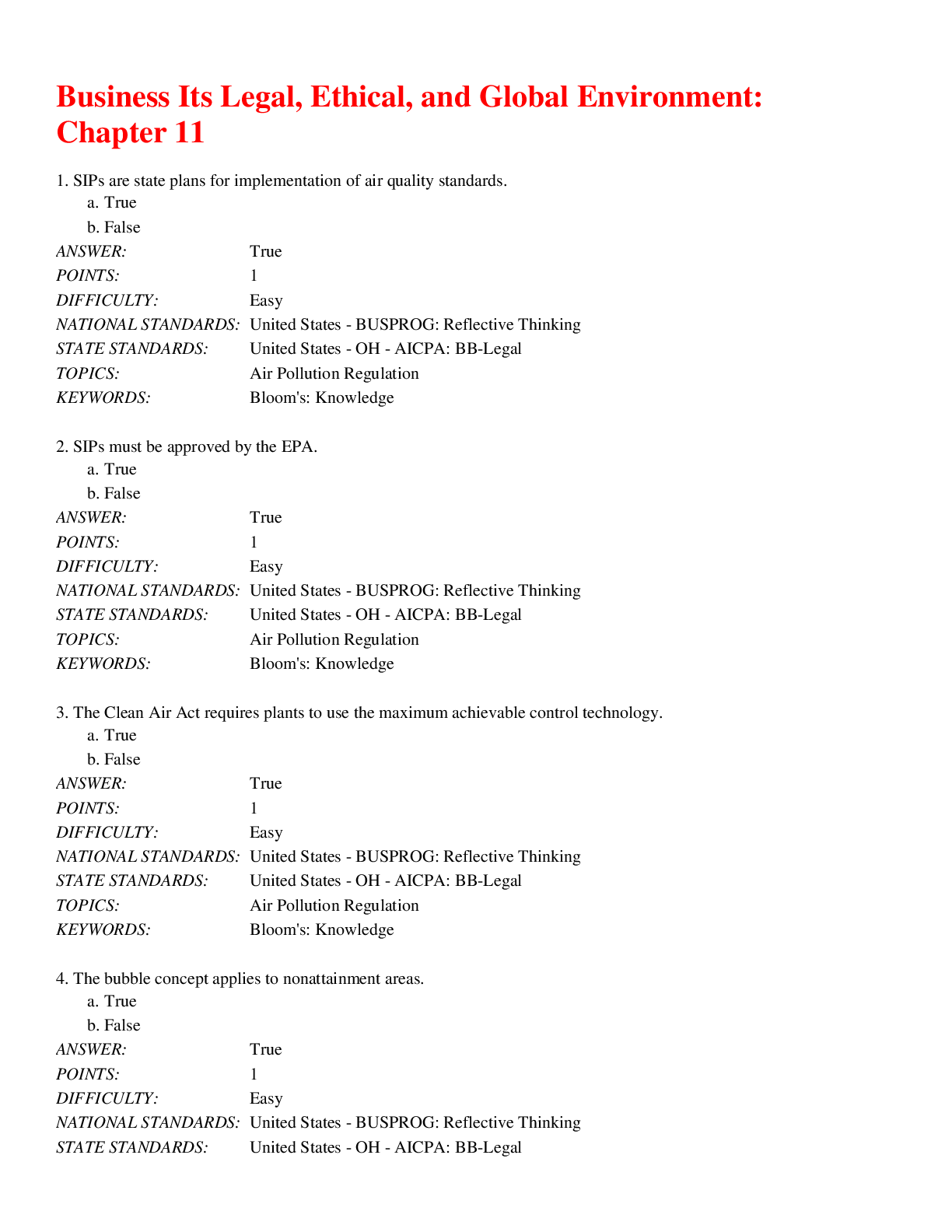Business Administration > QUESTIONS & ANSWERS > Business Its Legal, Ethical, and Global Environment: Chapter 10. All Answers (All)
Business Its Legal, Ethical, and Global Environment: Chapter 10. All Answers
Document Content and Description Below
Business Its Legal, Ethical, and Global Environment: Chapter 10 1. The Computer Fraud and Abuse Act (CFA) applies only to federal employees. a. b. : 1 Moderate : United S... tates - BUSPROG: Reflective Thinking : United States - OH - AICPA: BB-Legal : User Issues in Cyberspace : Bloom's: Knowledge 2. Under the Computer Fraud and Abuse Act (CFA), access to institutional financial information is not a violation. a. b. : 1 Moderate : United States - BUSPROG: Reflective Thinking : United States - OH - AICPA: BB-Legal : User Issues in Cyberspace : Bloom's: Knowledge 3. The Economic Espionage Act makes it a crime to take trade secrets by computer. a. b. : 1 Moderate : United States - BUSPROG: Reflective Thinking : United States - OH - AICPA: BB-Legal : Appropriation and Other Forms of Unfair Competition in Cyberspace : Bloom's: Comprehension 4. The Economic Espionage Act only applies in international transactions. a. b. : 1 Moderate : United States - BUSPROG: Reflective Thinking : United States - OH - AICPA: BB-Legal : Appropriation and Other Forms of Unfair Competition in Cyberspace : Bloom's: Comprehension 5. The transfer of copyrighted material worth over $1000 over the Internet is a crime. a. b. : 1 Easy : United States - BUSPROG: Reflective Thinking : United States - OH - AICPA: BB-Legal : Appropriation and Other Forms of Unfair Competition in Cyberspace : Bloom's: Knowledge 6. There are state laws, but no federal laws, concerning cyberbullying. a. b. : 1 Easy : United States - BUSPROG: Reflective Thinking : United States - OH - AICPA: BB-Legal : User Issues in Cyberspace : Bloom's: Knowledge 7. The Anti-Spam Technical Alliance is an industry group working to fight spam. a. b. : 1 Easy : United States - BUSPROG: Reflective Thinking : United States - OH - AICPA: BB-Legal : Appropriation and Other Forms of Unfair Competition in Cyberspace : Bloom's: Knowledge 8. State anti-spamming statutes are tied to the volume of messages. a. b. : 1 Moderate : United States - BUSPROG: Reflective Thinking : United States - OH - AICPA: BB-Legal : Appropriation and Other Forms of Unfair Competition in Cyberspace : Bloom's: Comprehension 9. Tapping into federal income tax returns to get information is a violation of the Computer Fraud and Abuse Act. a. b. : 1 Moderate : United States - BUSPROG: Reflective Thinking : United States - OH - AICPA: BB-Legal : User Issues in Cyberspace : Bloom's: Knowledge 10. Under the Federal Computer Fraud and Abuse Act, unauthorized access to government computers is a felony. a. b. : 1 Moderate : United States - BUSPROG: Reflective Thinking : United States - OH - AICPA: BB-Legal : User Issues in Cyberspace : Bloom's: Knowledge 11. Warrants are not required in cyberspace. a. b. : 1 Easy : United States - BUSPROG: Reflective Thinking : United States - OH - AICPA: BB-Legal : User Issues in Cyberspace : Bloom's: Knowledge 12. Fourth Amendment rights still apply on the Internet. a. b. : 1 Easy : United States - BUSPROG: Reflective Thinking : United States - OH - AICPA: BB-Legal : User Issues in Cyberspace : Bloom's: Knowledge 13. Servers are always required to reveal the identity of their customers and users. a. b. : 1 Moderate : United States - BUSPROG: Reflective Thinking : United States - OH - AICPA: BB-Legal : User Issues in Cyberspace : Bloom's: Comprehension 14. Which of the following is not a computer crime? a. unauthorized use of computer equipment b. alteration or destruction of computer files c. entering fraudulent data d. using computers to convert data e. All of the above are computer crimes. e : 1 Moderate : United States - BUSPROG: Reflective Thinking : United States - OH - AICPA: BB-Legal : User Issues in Cyberspace : Bloom's: Comprehension 15. Which is not covered under the Computer Fraud and Abuse Act (CFA)? a. unauthorized use of federal computers b. typewriters c. use in excess of authority by a federal employee d. consumer financial records e. All of the above are covered. b : 1 Moderate : United States - BUSPROG: Reflective Thinking : United States - OH - AICPA: BB-Legal : User Issues in Cyberspace : Bloom's: Application 16. The Economic Espionage Act covers: a. only international commercial transactions. b. the copying, downloading or electronic transfer of trade secrets. c. bribes to obtain government contracts. d. only national stock exchange companies. b : 1 Moderate : United States - BUSPROG: Reflective Thinking : United States - OH - AICPA: BB-Legal : Appropriation and Other Forms of Unfair Competition in Cyberspace : Bloom's: Comprehension 17. The No Electronic Theft Act: a. prohibits the use of the Internet for personal e-mail on company time. b. prohibits the transfer of copyrighted material worth over $1,000 over the Internet. c. prohibits economic espionage. d. resulted from the Volkswagen/GM espionage case. b : 1 Moderate : United States - BUSPROG: Reflective Thinking : United States - OH - AICPA: BB-Legal : Appropriation and Other Forms of Unfair Competition in Cyberspace : Bloom's: Comprehension 18. Which of the following would be a federal crime? a. copying FDIC data without authorization b. changing figures on military invoices without authorization c. placing a virus on a federal computer system d. All of the above are federal crimes. d : 1 Moderate : United States - BUSPROG: Reflective Thinking : United States - OH - AICPA: BB-Legal : User Issues in Cyberspace : Bloom's: Application 19. The No Electronic Theft Act: a. makes it a crime to use the Internet to pass along copyrighted material even when there is no profit. b. applies only when copyrighted material is used for profit. c. does not apply to written materials. d. none of the above a : 1 Moderate : United States - BUSPROG: Reflective Thinking : United States - OH - AICPA: BB-Legal : Appropriation and Other Forms of Unfair Competition in Cyberspace : Bloom's: Comprehension 20. Which act did federal prosecutors use for acts of cyberbullying? a. Anti-Cyberbullying Act of 2009 b. Computer Fraud and Abuse Act c. Computer Fraud and Bullying Act d. Computer Stalking and Bullying Act of 2008 b : 1 Moderate : United States - BUSPROG: Reflective Thinking : United States - OH - AICPA: BB-Legal : User Issues in Cyberspace : Bloom's: Comprehension 21. The CAN-SPAM Act: a. is part of Sarbanes-Oxley. b. allows companies to bring suit against spammers for their unauthorized use of their servers. c. has been declared unconstitutional. d. none of the above b : 1 Moderate : United States - BUSPROG: Reflective Thinking : United States - OH - AICPA: BB-Legal : Appropriation and Other Forms of Unfair Competition in Cyberspace : Bloom's: Comprehension 22. Which of the following is a violation of the Economic Espionage Act? a. Downloading your employer’s website program to take to your new job. b. Sketching your employer’s new trademark to register first. c. Photographing customer lists of a competitor. d. All of the above are EEA violations. d : 1 Moderate : United States - BUSPROG: Reflective Thinking : United States - OH - AICPA: BB-Legal : Appropriation and Other Forms of Unfair Competition in Cyberspace : Bloom's: Application 23. The FBI wants to conduct a search of your work computer. To do so: a. the FBI needs your permission. b. the FBI needs a warrant. c. either a or b d. both a and b c : 1 Moderate : United States - BUSPROG: Reflective Thinking : United States - OH - AICPA: BB-Legal : User Issues in Cyberspace : Bloom's: Comprehension 24. Which act makes it a crime to willfully infringe copyrighted materials via electronic means that worth more than $1,000? a. The Digital Millennium Copyright Act b. The No Electronic Theft Act c. The Economic Espionage Act d. There is no criminal statute for electronic infringement; it is a civil matter only. b : 1 Moderate : United States - BUSPROG: Reflective Thinking : United States - OH - AICPA: BB-Legal : Appropriation and Other Forms of Unfair Competition in Cyberspace : Bloom's: Application 25. Answer the following: a. Bruce King is a computer whiz who works at the county complex where all records for criminal cases are kept. He has developed a means for deleting criminal records from the files and has contacted defendants to offer them the deletion in exchange for a substantial fee. Has King committed any crimes with his actions? b. What if King worked for a credit reporting firm and offered the deletion service to folks with bad credit ratings? Would the result be the same? a. Fraud, extortion. Perhaps some specific crimes such as destruction of public records. b. Fraud. Obtaining credit under pretenses. : 1 Challenging : United States - BUSPROG: Analytic : United States - OH - AICPA: BB-Critical Thinking : Employers, Employees, and Cyberlaw : Bloom's: Analysis 26. Janet Walker is a computer information systems major who has been able to tap into an ice cream manufacturer's computer system. As a practical joke, Walker changes the manufacturer's ice cream formula so that an entire day's production has a bitter taste to it. Has Walker committed any crime? Theft (converted property by making it useless); vandalism; conversion (resources used). : 1 Challenging : United States - BUSPROG: Analytic : United States - OH - AICPA: BB-Critical Thinking : User Issues in Cyberspace : Bloom's: Analysis 27. Jan Lesh was able to gain access to the federal government's records on student loans and loan repayments. Lesh changed his loan balance from $8200.00 to $2800.00. Lesh then repaid the $2800.00 and received his notice of payment in full. Has Lesh committed any crimes? Lesh has violated the Counterfeit Access Device and Computer Fraud and Abuse Act. He accessed the information on student loans without authorization and then changed the amount of his loan balance. In addition, the repayment of only $2800 as opposed to $8200 and the receipt of the "payment in full" statement was a form of theft. Lesh took funds from the government that did not belong to him. He accomplished the embezzlement in a peculiar way, but he did take government funds. : 1 Challenging : United States - BUSPROG: Analytic : United States - OH - AICPA: BB-Critical Thinking : User Issues in Cyberspace : Bloom's: Analysis 28. Bradley Harrison was hired by Billiards, Inc. Before leaving his current employer, Pool Party, Inc., he downloaded Pool Party's contract forms and customer lists to take with him to his new job. Has Bradley broken any laws? Economic Espionage Act - appropriating trade secrets by download. : 1 Challenging : United States - BUSPROG: Analytic : United States - OH - AICPA: BB-Critical Thinking : Appropriation and Other Forms of Unfair Competition in Cyberspace : Bloom's: Analysis 29. Evaluate the following statement: "Warrants are not required for searches in cyberspace." The statement is not entirely correct. There are still rights of privacy on the Internet. For example, the FBI and other government agencies could not have access to your private account e-mail without a warrant. However, there are some aspects of the Internet that are more public in nature, such as the visits to sites and the use of information from sites because of the records that are maintained by companies. The key is the expectation of privacy. : 1 Challenging : United States - BUSPROG: Analytic : United States - OH - AICPA: BB-Critical Thinking : Employers, Employees, and Cyberlaw : Bloom's: Comprehension 30. Cyberspace companies are exempt from the consumer privacy rules on use of consumer information and sale of consumer lists. a. b. : 1 Easy : United States - BUSPROG: Reflective Thinking : United States - OH - AICPA: BB-Legal : User Issues in Cyberspace : Bloom's: Knowledge 31. E-merchants need not follow the same FTC rules that apply to catalog merchants. a. b. : 1 Easy : United States - BUSPROG: Reflective Thinking : United States - OH - AICPA: BB-Legal : User Issues in Cyberspace : Bloom's: Knowledge 32. Which agency is responsible for consumer complaints about e-merchants? a. The Federal Trade Commission. b. There is no federal agency responsible because the federal government has no jurisdiction in cyberspace. c. The Social Security Administration. d. none of the above a : 1 Moderate : United States - BUSPROG: Reflective Thinking : United States - OH - AICPA: BB-Legal : User Issues in Cyberspace : Bloom's: Knowledge 33. Employers are responsible for the content of employee e-mails. a. b. : 1 Easy : United States - BUSPROG: Reflective Thinking : United States - OH - AICPA: BB-Legal : Employers, Employees, and Cyberlaw : Bloom's: Knowledge 34. Employers are responsible when employees use their computers to infringe on others’ intellectual property rights. a. b. : 1 Easy : United States - BUSPROG: Reflective Thinking : United States - OH - AICPA: BB-Legal : Employers, Employees, and Cyberlaw : Bloom's: Knowledge 35. Employee e-mails cannot be obtained through discovery processes in litigation against the company because of Fifth Amendment protections. a. b. : 1 Easy : United States - BUSPROG: Reflective Thinking : United States - OH - AICPA: BB-Legal : Employers, Employees, and Cyberlaw : Bloom's: Knowledge 36. The Electronic Communications Privacy Act applies to all forms of electronic communication. a. b. : 1 Easy : United States - BUSPROG: Reflective Thinking : United States - OH - AICPA: BB-Legal : Employers, Employees, and Cyberlaw : Bloom's: Knowledge 37. Employees are not required to give consent to employer access to their e-mails under the Stored Communications Act. a. b. : 1 Easy : United States - BUSPROG: Reflective Thinking : United States - OH - AICPA: BB-Legal : Employer, Employees, and Cyberlaw : Bloom's: Knowledge 38. An employee who uses his or her company e-mail system to communicate privately with his or her lawyer has waived the privilege and the content can be used in court. a. b. : 1 Moderate : United States - BUSPROG: Reflective Thinking : United States - OH - AICPA: BB-Legal : Employers, Employees, and Cyberlaw : Bloom's: Knowledge 39. The employer practice of “Googling” job applicants is not prohibited by federal law. a. b. : 1 Moderate : United States - BUSPROG: Reflective Thinking : United States - OH - AICPA: BB-Legal : Employers, Employees, and Cyberlaw : Bloom's: Knowledge 40. Employers are permitted to monitor employee Tweets about company issues. a. b. : 1 Moderate : United States - BUSPROG: Reflective Thinking : United States - OH - AICPA: BB-Legal : Employers, Employees, and Cyberlaw : Bloom's: Knowledge 41. An employee can be prosecuted for giving his or her company user name and password to hackers. a. b. : 1 Moderate : United States - BUSPROG: Reflective Thinking : United States - OH - AICPA: BB-Legal : Employers, Employees, and Cyberlaw : Bloom's: Knowledge 42. Employee e-mails can be used to establish criminal intent in prosecution of companies. a. b. : 1 Moderate : United States - BUSPROG: Reflective Thinking : United States - OH - AICPA: BB-Legal : Employers, Employees, and Cyberlaw : Bloom's: Knowledge 43. Internet companies are permitted to collect information about users’ purchasing habits without advance disclosure. a. b. : 1 Moderate : United States - BUSPROG: Reflective Thinking : United States - OH - AICPA: BB-Legal : User Issues in Cyberspace : Bloom's: Knowledge 44. Under federal law, ISPs are not permitted to disclose your identity when someone asks for the actual name behind a user name. a. b. : 1 Moderate : United States - BUSPROG: Reflective Thinking : United States - OH - AICPA: BB-Legal : User Issues in Cyberspace : Bloom's: Knowledge 45. Users do have some First Amendment protections from identity disclosure. a. b. : 1 Moderate : United States - BUSPROG: Reflective Thinking : United States - OH - AICPA: BB-Legal : User Issues in Cyberspace : Bloom's: Knowledge 46. The privacy rights of cloud customers are clearly established. a. b. : 1 Moderate : United States - BUSPROG: Reflective Thinking : United States - OH - AICPA: BB-Legal : User Issues in Cyberspace : Bloom's: Knowledge 47. At least one court has held that the placement of cookies on an individual’s computer without consent is a form of unauthorized access. a. b. : 1 Moderate : United States - BUSPROG: Reflective Thinking : United States - OH - AICPA: BB-Legal : User Issues in Cyberspace : Bloom's: Knowledge 48. There are both federal and state anti-cyberstalking laws. a. b. : 1 Moderate : United States - BUSPROG: Reflective Thinking : United States - OH - AICPA: BB-Legal : User Issues in Cyberspace : Bloom's: Knowledge 49. COPPA is a federal law that controls the posting of pornographic images online. a. b. : 1 Moderate : United States - BUSPROG: Reflective Thinking : United States - OH - AICPA: BB-Legal : User Issues in Cyberspace : Bloom's: Knowledge 50. Craigslist is liable for criminal acts that occur because of connections made between buyers and sellers using its service. a. b. : 1 Moderate : United States - BUSPROG: Reflective Thinking : United States - OH - AICPA: BB-Legal : User Issues in Cyberspace : Bloom's: Knowledge 51. Jane Erroll has applied for a position with Lakes Distribution Company. When Jane arrives for her interview she is asked several questions about events and photos that were posted on her Facebook page. Jane has an open setting on her Facebook page so that it is publicly available. Jane apparently did not provide sufficient explanations for what was posted on her Facebook page and does not get the job despite being qualified for the position. Which of the following statements is correct about Jane’s experience? a. The employer’s conduct violated federal law. b. As long as the employer looked at all the job candidates’ Facebook pages, the employer has not violated any federal laws. c. Jane must give her consent before the employer can look at her Facebook page. d. The employer has violated the Stored Communications Act. b : 1 Challenging : United States - BUSPROG: Reflective Thinking : United States - OH - AICPA: BB-Legal : Employers, Employees, and Cyberlaw : Bloom's: Knowledge Lakes Distribution Company has its employees sign a policy that discloses the following: • Lakes can monitor text messages sent using company cell phones. • Lakes can monitor all e-mails sent by employees, regardless of which e-mail account used (company e-mail system or private, such as gmail or aol.com). • Lakes requires that employees furnish access to their Facebook pages as a precondition of employment. • Lakes monitors all Tweets and blog posts by employees. 52. Which of the following is correct about Lakes’ policy on text messages? a. The monitoring is overly broad and will not be permitted under federal law. b. The monitoring must be restricted to business messages and not personal messages. c. The monitoring policy fits within current legal standards. d. The monitoring is not permitted. c : 1 Challenging : United States - BUSPROG: Reflective Thinking : United States - OH - AICPA: BB-Legal : Employers, Employees, and Cyberlaw : Bloom's: Comprehension 53. Which of the following is correct about Lakes’ policy on e-mails? a. The monitoring is overly broad and will not be permitted under federal law. b. The monitoring is limited to company e-mail messages, but personal email messages are discoverable. c. The monitoring policy fits within current legal standards. d. The monitoring is not permitted. b : 1 Challenging : United States - BUSPROG: Reflective Thinking : United States - OH - AICPA: BB-Legal : Employers, Employees, and Cyberlaw : Bloom's: Comprehension 54. Which of the following is correct about Lakes’ policy on Facebook access? a. The monitoring may be overly broad. b. The monitoring may be prohibited in certain states. c. The monitoring policy may not fit within current legal standards. d. The monitoring is not permitted. e. a, b, and c e : 1 Challenging : United States - BUSPROG: Reflective Thinking : United States - OH - AICPA: BB-Legal : Employers, Employees, and Cyberlaw : Bloom's: Comprehension 55. Which of the following is correct about Lakes’ policy on Tweets? a. The monitoring is overly broad and will not be permitted under federal law. b. The monitoring is limited to company e-mail messages, but personal email messages are discoverable. c. The monitoring policy fits within current legal standards. d. The monitoring is not permitted. e. a, b, and c c : 1 Challenging : United States - BUSPROG: Reflective Thinking : United States - OH - AICPA: BB-Legal : Employers, Employees, and Cyberlaw : Bloom's: Comprehension 56. IFRACK is the user name of an individual who has been posting information about fracking on blogs, in chat rooms, and in cyber letters to newspapers. Several environmental groups wish to stop the comments IFRACK makes, believe that IFRACK may be affiliated with the oil industry, and believe that information should be disclosed. Which of the following is correct in analyzing this situation? a. The environmental groups will be able to obtain IFRACK’s identity from the ISP because they have a good reason. b. The environmental groups are not entitled to know IFRACK’s identity because of First Amendment protections. c. Until IFRACK violates the law, his or her identity cannot be disclosed by the ISP. d. There is never identity disclosure allowed in civil matters. b : 1 Challenging : United States - BUSPROG: Reflective Thinking : United States - OH - AICPA: BB-Legal : User Issues in Cyberspace : Bloom's: Comprehension 57. With what area of the law is there tension as the courts deal with cyberbullying issues? a. Privacy b. First Amendment rights c. Interstate commerce d. all of the above b : 1 Challenging : United States - BUSPROG: Reflective Thinking : United States - OH - AICPA: BB-Legal : User Issues in Cyberspace : Bloom's: Comprehension 58. Which federal law controls websites that collect information from children? a. The CFAA b. The ECPA c. The NSA d. none of the above d : 1 Challenging : United States - BUSPROG: Reflective Thinking : United States - OH - AICPA: BB-Legal : User Issues in Cyberspace : Bloom's: Comprehension 59. The COPPA act: a. applies to only retailers selling online. b. applies only to interstate businesses. c. applies to websites that collect information from children. d. applies to websites that have pornography posted. c : 1 Challenging : United States - BUSPROG: Reflective Thinking : United States - OH - AICPA: BB-Legal : User Issues in Cyberspace : Bloom's: Comprehension 60. Rune Rutledge was looking for a mercenary to kill his business partner. He found a listing on Craigslist that indicated the following: “Former IRAQ War solider. Protection services and other types of services available for those who need to send a message to others.” Rune made contact with the soldier and the two entered into a contract for the solider to kill Rune’s partner. Rune’s partner was killed and his partner’s family has sued Craigslist. Which of the following is an accurate summary of the legal issues in this situation? a. Craigslist is liable for not properly screening the ads. b. Craigslist is not liable because of First Amendment protections. c. Craigslist is not liable unless it was aware of the ad and the soldier’s intentions. d. none of the above c : 1 Challenging : United States - BUSPROG: Reflective Thinking : United States - OH - AICPA: BB-Legal : User Issues in Cyberspace : Bloom's: Comprehension 61. Explain what customers of cloud services should understand prior to entering into a cloud agreement. The information in the clouds is completely within the hands of a third party. Trust, service levels, and technological flaws are all issues in these relationships. One of the benefits of cloud computing is that companies have instantaneous access to computer processing services for a fee, something that does not require substantial capital expense and allows for rapid growth. However, legal rights, in terms of ready customer access to information in the cloud, privacy rights with respect to the cloud companies’ use and examination of the information, and glitches in information retrieval remain unresolved. Customers of cloud services should iron out all of these issues before any information is deposited with a third party. : 1 Challenging : United States - BUSPROG: Analytic : United States - OH - AICPA: BB-Critical Thinking : User Issues in Cyberspace : Bloom's: Analysis 62. Consumer information obtained over the Internet cannot be used without their permission. a. b. : 1 Moderate : United States - BUSPROG: Analytic : United States - OH - AICPA: BB-Legal : User Issues in Cyberspace : Bloom's: Knowledge 63. Employers have no right of access to employees’ e-mails if they promised the employees privacy. a. b. : 1 Moderate : United States - BUSPROG: Analytic : United States - OH - AICPA: BB-Legal : Employers, Employees, and Cyberlaw : Bloom's: Knowledge 64. Employer monitoring of employee e-mail is illegal. a. b. : 1 Easy : United States - BUSPROG: Analytic : United States - OH - AICPA: BB-Legal : Employers, Employees, and Cyberlaw : Bloom's: Knowledge 65. Sheila Rumsford sent an e-mail to her co-workers. The e-mail was entitled, "Ten Reasons Cookie Dough is Better Than Men." Her supervisor, in a routine review of employee e-mails, found the e-mail and fired Sheila. The supervisor pointed to a provision in the employee handbook that prohibits the use of company e-mail for jokes and personal correspondence. a. Sheila's right to privacy has been violated and she cannot be terminated. b. Sheila could be fired only if one of the recipients of the e-mail sent it to the supervisor. c. Sheila's e-mail was properly monitored and she can be fired. d. Sheila has a right of recovery for defamation. e. none of the above c : 1 Challenging : United States - BUSPROG: Analytic : United States - OH - AICPA: BB-Legal : Employers, Employees, and Cyberlaw : Bloom's: Application [Show More]
Last updated: 1 year ago
Preview 1 out of 18 pages
Instant download
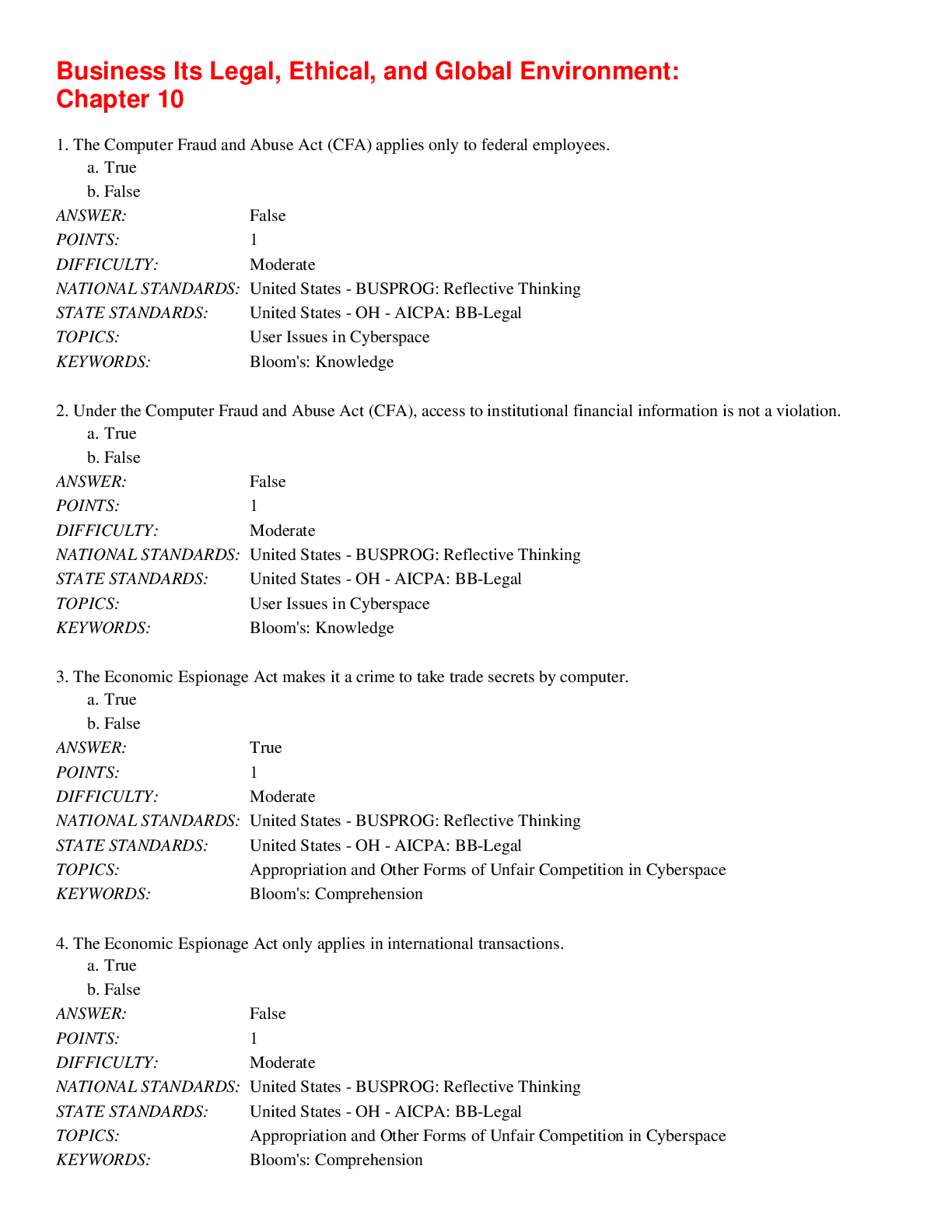
Buy this document to get the full access instantly
Instant Download Access after purchase
Add to cartInstant download
Reviews( 0 )
Document information
Connected school, study & course
About the document
Uploaded On
Dec 07, 2019
Number of pages
18
Written in
Additional information
This document has been written for:
Uploaded
Dec 07, 2019
Downloads
0
Views
65

